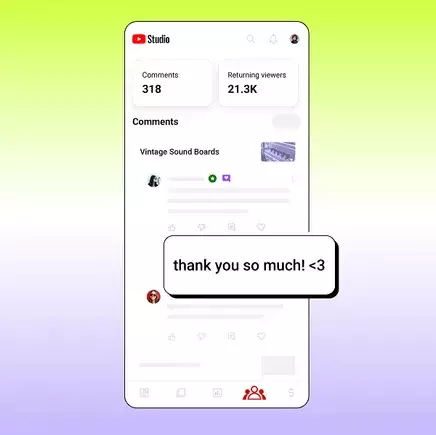YouTube has introduced a beta feature aimed at enhancing creator interactions through AI-generated reply suggestions. This innovation, while seemingly convenient, raises significant questions about the impact of automation on genuine engagement in the digital landscape. In the era of social media, where authenticity is paramount, the integration of AI tools into personal interactions poses both potential benefits and drawbacks.
YouTube’s announcement detailed an experimental feature designed to streamline the communication process between creators and their audiences. Utilizing AI technology, the platform aims to offer editable reply suggestions that align with the creator’s established tone and style. These suggestions are purportedly generated by analyzing previous interactions, thereby presenting responses that creators can personalize before sharing. According to YouTube, creators participating in this experiment will notice these suggestions within the Comments and Community tabs of YouTube Studio, as well as on the mobile app. This capability echoes features found in platforms like Gmail, indicating a broader trend towards automation in online communication.
While the mechanism can potentially facilitate increased engagement for creators inundated with comments, the essence of this innovation warrants scrutiny. Relying on AI to generate replies risks undermining the sincerity of interactions, potentially transforming vibrant conversations into mechanical exchanges devoid of genuine sentiment.
The proposal to integrate AI-driven suggestions into the comment section of YouTube raises a fundamental dilemma: Should convenience come at the expense of authenticity? For creators who manage large followings and receive countless comments, the allure of easily crafted replies is tempting; it undoubtedly saves time and energy. However, this shift towards automation can detract from the heart of social media—the human connection.
The essence of social platforms is rooted in authentic interactions. Engaging with followers through personal responses fosters community, brand loyalty, and trust. When creators delegate their interactions to AI, they risk distorting that relationship, potentially alienating fans who value sincerity over speed. Moreover, the proliferation of bots and automated responses may lead to an overall decline in quality discourse within the platform’s community.
As we navigate the increasingly automated landscape of online communication, it is essential to consider the broader implications of these technological advancements. With platforms like YouTube introducing features that incentivize automation, the question emerges: Are we all just cogs in a digital machine? The affinity for engaging with real voices and perspectives drives the social media experience. If these interactions devolve into a series of automated replies, users may gravitate towards tighter-knit communities where genuine dialogue flourishes.
The concerns are mirrored in other social media initiatives, such as Meta’s project allowing creators to develop AI chatbots. While the intention is to mirror the creator’s voice, this model further dilutes genuine communication. As users encounter more automated responses, there lies a perilous risk of becoming desensitized to real human interaction—ultimately leading to an isolated digital experience.
In the pursuit of efficiency, YouTube and similar platforms must carefully weigh the benefits of automation against the preservation of authenticity. While AI-generated response suggestions may offer a lifeline for creators overwhelmed by interaction demands, they should be implemented judiciously. The goal should not be to replace genuine conversation but to enhance it.
There are clear scenarios where automated suggestions could prove invaluable, allowing creators to maintain a dialogue with their audience while focusing on content creation. Nonetheless, it is crucial that these features remain an option rather than a necessity. Encouraging creators to opt for meaningful engagement over automated responses could safeguard the communal spirit of social media platforms.
YouTube’s testing phase for AI-generated reply suggestions is an interesting venture into the future of digital engagement. As the experiment unfolds, it is essential for creators and users alike to remain vigilant about the implications of automation in their interactions. The ongoing challenge will lie in balancing the conveniences afforded by technology with the irreplaceable value of authentic human connection. Therefore, as we embrace innovation, we must strive to preserve the essence of what makes social media, well, social.

